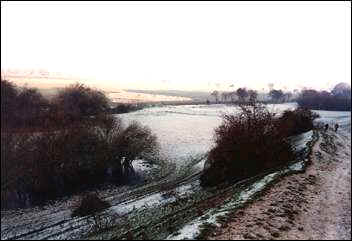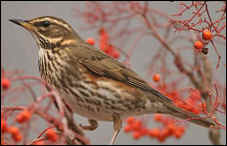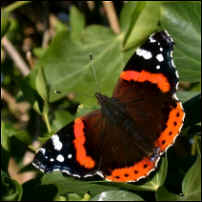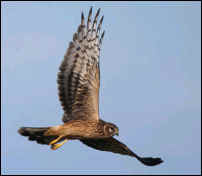|
THE COOKHAM DOSSIER |
|
PRE-CHRISTMAS
UPDATE
There was war in my garden this morning. The resident Blackbirds were already on high alert due to the recent presence of a small group of Redwings, delightfully-marked birds from Scandinavia who pop over here most winters to plunder our berries. These Norse invaders soon attract the attention of resident thrushes such as Blackbirds who have derived a number of strategies for defending ‘their’ food stores.
The home team were busy implementing this action when, horror upon horror, about 8 new Blackbirds turned up, mainly interested in a huge amount of bread we had put out (we do not often use this food source, but a loaf was on the verge of going off and I couldn’t simply bin it). The newcomers were mostly first winter males, some with remnant of brown juvenile plumage amongst the new black feathers. So this hoard of grateful wanderers decided to take advantage. Well, the resident pair was by now on Defcon 1 status and were soon haring around trying to harass the rampaging ranks of young Blackbirds, whilst also trying to maintain the pestering of the Redwings. As if this action were not enough in our tiny garden, we suddenly noted that ‘our’ pair of Robins had also become most agitated. A closer look at their end of the garden revealed a Blackcap, a fine male, suitably plumaged to match its name. Then a female, with her chocolatey brown cap hoved in to view, then yet another male and still another and finally a fourth male, making this the largest ‘flock’ of Blackcaps we have ever had in the garden. I’ve probably mentioned before that traditionally the Blackcap was a summer visitor from Africa, and indeed it still is; but more and more we are seeing Scandinavian Blackcaps on their way to Africa via UK and Spain, deciding to stay over in our generally milder winter climate. And here was a roving group taking temporary residence in our tiny garden, one male concentrating on the nectar available from a small mahonia (the berries long since gone), the others content to forage amongst the ivy. And so ensued the Battle of Broomhill with the 4 resident birds charging around like lunatics attempting to see the interlopers off, mostly without success it has to be said. I will try and keep a look on the battlefield over the next few days to see which side wins.
Having mentioned garden clearing, other creatures that can just as easily be hurt or killed at this time of year are Hedgehogs, which will have created a nest ball of vegetation somewhere in a quiet corner, and Toads which will have crawled under stones or bricks or piles of rubble. I’m often asked how one knows if there are likely to be such refuges in use in one’s garden. Well, a first and cheeky reply is that, if you are employing a gardener, probably not! Wildlife generally thrive best where there are scruffy, less militarily–managed parts of the garden, something no self-respecting gardening contractor would probably encourage. Also, if every leaf that had the audacity to fall into your garden has been machine blown into a big pile and disposed of, probably not again, as this sort of material provides homes for numerous insects, small mammals and slow worms etc to find shelter for the winter. So leave a few areas of ‘scrub’, don’t mow ALL the lawn to Lorial standards, and encourage the odd nettle to thrive and hey presto, far more wildlife next season. Finally, an appeal for pond life (and I will not be drawn down the obvious line on this one!). We know of a reasonable number of ponds throughout the Cookhams, mostly in people’s gardens, and thank you to those who invited us in to view their ponds or undertake surveys of aquatic life this year. But we need many more. Many of our most interesting insects such as Dragonflies can only prosper with good ponds in which to breed. And given that their nymphs may be in there for up to 5 years before emerging, a competing swarm of fish does not help, so have a small pond purely for wildlife and a separate on for any fish you fish to keep. Alternatively, if there is only room for one pond, put a divider across the middle so fish can live one side and wildlife the other. There are some excellent resources on pond design, surveying methods and garden pond management on www.pondconservation.org.uk which is an organisation implementing a government-inspired plan to have 1 million new ponds created in the next 50 years. There are even useful grants available through the scheme to help with the provision of each new one we plan. Do visit the site.
Season Greetings Birdman
Do please get involved and help us find out more of our local wildlife. email wildlife@cookham.com
|
|

 One
is to set forth on a series of sorties, flying ominously straight
at the smaller, daintier Redwings in an attempt to
intimidate them off their territory. They soon however realise
this does not work. Back at home, Redwings have to put up
with bullying Ring Ouzels which are far bigger and fiercer
than our Blackbirds. So the next strategy is to follow them
around ‘chucking’ in their left ears as if to bore them out of
the bushes, but generally this also fails. So they then resort to
the last ditch strategy of picking off loads of berries and
dropping them on the floor, right in front of the ‘enemy’. One
supposes this destructive policy will make the outsiders assume
that, if they do not move on, there will be no food left anyway,
so best beat a hasty retreat (and try to sneak back later to
finish off what is left).
One
is to set forth on a series of sorties, flying ominously straight
at the smaller, daintier Redwings in an attempt to
intimidate them off their territory. They soon however realise
this does not work. Back at home, Redwings have to put up
with bullying Ring Ouzels which are far bigger and fiercer
than our Blackbirds. So the next strategy is to follow them
around ‘chucking’ in their left ears as if to bore them out of
the bushes, but generally this also fails. So they then resort to
the last ditch strategy of picking off loads of berries and
dropping them on the floor, right in front of the ‘enemy’. One
supposes this destructive policy will make the outsiders assume
that, if they do not move on, there will be no food left anyway,
so best beat a hasty retreat (and try to sneak back later to
finish off what is left). In
the meantime, we of course saw some serious colder spells (well,
for the Thames Valley anyway) in recent days but sunny periods in
between have still tempted a few late-flying Red Admirals,
perhaps trying to find a last minute feed before folding up their
wings for the winter in a garden shed or porch-way. I’d be
interested to hear of any such observations of hibernating
butterflies and moths that will be tucked up for the next few
weeks. The odd Bumble Bee might still be seen wandering
apparently aimlessly during our shorter days. These will be the
queens (the rest of the hive die off and do not survive winter),
and if it remains relatively mild, they may be seen on the wing
throughout winter, so do not be too surprised to come across one.
They do react to the cold, but have a remarkable ability to
self-dislocate their wings and use their flight muscles to vibrate
their body and generate heat. Numbers of all our bees
(bumbles, solitary, mining and honey bees) are declining rapidly
at present and as they are responsible for the major part of the
pollination of the nation’s plants and crops, further declines
would become very worrying indeed. You can help by firstly being
very careful with garden clearing in spring to ensure you do not
damage any bees nests found. Also, before calling in the pest
controller to rid you of the ‘wasp’ infestation, do check to
ensure they are indeed wasps and not harmless colonial bees.
Another confusing insect is the huge hornet-like hoverfly Volucella
zonaria, a stunning insect I saw several of this autumn.
In
the meantime, we of course saw some serious colder spells (well,
for the Thames Valley anyway) in recent days but sunny periods in
between have still tempted a few late-flying Red Admirals,
perhaps trying to find a last minute feed before folding up their
wings for the winter in a garden shed or porch-way. I’d be
interested to hear of any such observations of hibernating
butterflies and moths that will be tucked up for the next few
weeks. The odd Bumble Bee might still be seen wandering
apparently aimlessly during our shorter days. These will be the
queens (the rest of the hive die off and do not survive winter),
and if it remains relatively mild, they may be seen on the wing
throughout winter, so do not be too surprised to come across one.
They do react to the cold, but have a remarkable ability to
self-dislocate their wings and use their flight muscles to vibrate
their body and generate heat. Numbers of all our bees
(bumbles, solitary, mining and honey bees) are declining rapidly
at present and as they are responsible for the major part of the
pollination of the nation’s plants and crops, further declines
would become very worrying indeed. You can help by firstly being
very careful with garden clearing in spring to ensure you do not
damage any bees nests found. Also, before calling in the pest
controller to rid you of the ‘wasp’ infestation, do check to
ensure they are indeed wasps and not harmless colonial bees.
Another confusing insect is the huge hornet-like hoverfly Volucella
zonaria, a stunning insect I saw several of this autumn. Birdwatchers
in the region have been thrilled with all sorts of surprises
already this month, with 5 Short-eared Owls, 4 Barn Owls
and a Hen Harrier at a site near Aylesbury, a Common
Scoter which has taken up residence at Dorney Lake instead of
being far out to sea, Goldeneye and Smew at nearby
Bray Gravel pit and a small flock of Russian Whooper Swans
wandering around the area. In the village, our own Barn Owls
are still active after dark, a Peregrine has been seen
harrying flocks of Starlings, and no fewer than 3200 Woodpigeons
were counted in freshly-seeded fields along the Switchback. I
thought the summer group of young Red Kites had started to
disperse, but there were still 36 of them together earlier this
week. And the latest news is that Waxwings have now reached
Buckinghamshire so surely it is only a question of time before
some of the many hundreds that have invaded Scotland this year
filter their way down to Berks and the Cookhams. A group of these
on berry-bearing plants in your garden would probably rank amongst
the better of your Christmas presents this year.
Birdwatchers
in the region have been thrilled with all sorts of surprises
already this month, with 5 Short-eared Owls, 4 Barn Owls
and a Hen Harrier at a site near Aylesbury, a Common
Scoter which has taken up residence at Dorney Lake instead of
being far out to sea, Goldeneye and Smew at nearby
Bray Gravel pit and a small flock of Russian Whooper Swans
wandering around the area. In the village, our own Barn Owls
are still active after dark, a Peregrine has been seen
harrying flocks of Starlings, and no fewer than 3200 Woodpigeons
were counted in freshly-seeded fields along the Switchback. I
thought the summer group of young Red Kites had started to
disperse, but there were still 36 of them together earlier this
week. And the latest news is that Waxwings have now reached
Buckinghamshire so surely it is only a question of time before
some of the many hundreds that have invaded Scotland this year
filter their way down to Berks and the Cookhams. A group of these
on berry-bearing plants in your garden would probably rank amongst
the better of your Christmas presents this year.